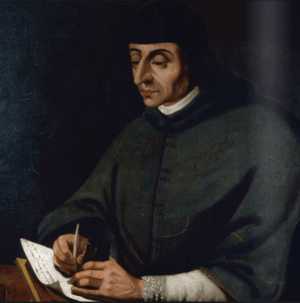Francisco Cervantes de Salazar facts for kids
Francisco Cervantes de Salazar (born around 1514 – died 1575) was a Spanish writer and scholar. He became the head, or rector, of the important Royal and Pontifical University of Mexico. This university was founded in 1551.
Early Life and Education
Francisco Cervantes de Salazar was born and grew up in Toledo, Spain. He first went to Alejo Venegas’s Grammar School. Later, he studied at the famous University of Salamanca.
In 1539, he traveled with Pedro Giron to the Low Countries (modern-day Netherlands and Belgium). There, he met a well-known scholar named Juan Luis Vives.
In 1546, Cervantes de Salazar published a collection of three different writings. One of these was Diálogo de la dignidad del hombre by Pérez de Oliva. Cervantes de Salazar actually added a lot to this work, making it much longer.
Life in Mexico
Around 1550, Francisco Cervantes de Salazar moved from Spain to Mexico. He lived there for the rest of his life. He had a very successful career at the new University of Mexico.
He was chosen to be the rector (the head of the university) two times. This shows how respected he was in the academic world.
His Writings
Cervantes de Salazar wrote several important works. In 1554, he published a collection of Latin dialogues. These dialogues described the city of Mexico in detail.
He also started writing a long history book about the Spanish conquest of Mexico. This book was called Crónica de la Nueva España (Chronicle of New Spain). He worked on it around 1560, but he never finished it. The book was not published until 1914, many years after his death.
A Possible New Discovery
Recently, some experts have suggested something very interesting. They think that Francisco Cervantes de Salazar might be the author of the first picaresque novel. This famous novel is called La vida de Lazarillo de Tormes (The Life of Lazarillo de Tormes), which was published in 1554. If this is true, it would make him an even more important figure in Spanish literature.
See also
 In Spanish: Francisco Cervantes de Salazar para niños
In Spanish: Francisco Cervantes de Salazar para niños
 | May Edward Chinn |
 | Rebecca Cole |
 | Alexa Canady |
 | Dorothy Lavinia Brown |


